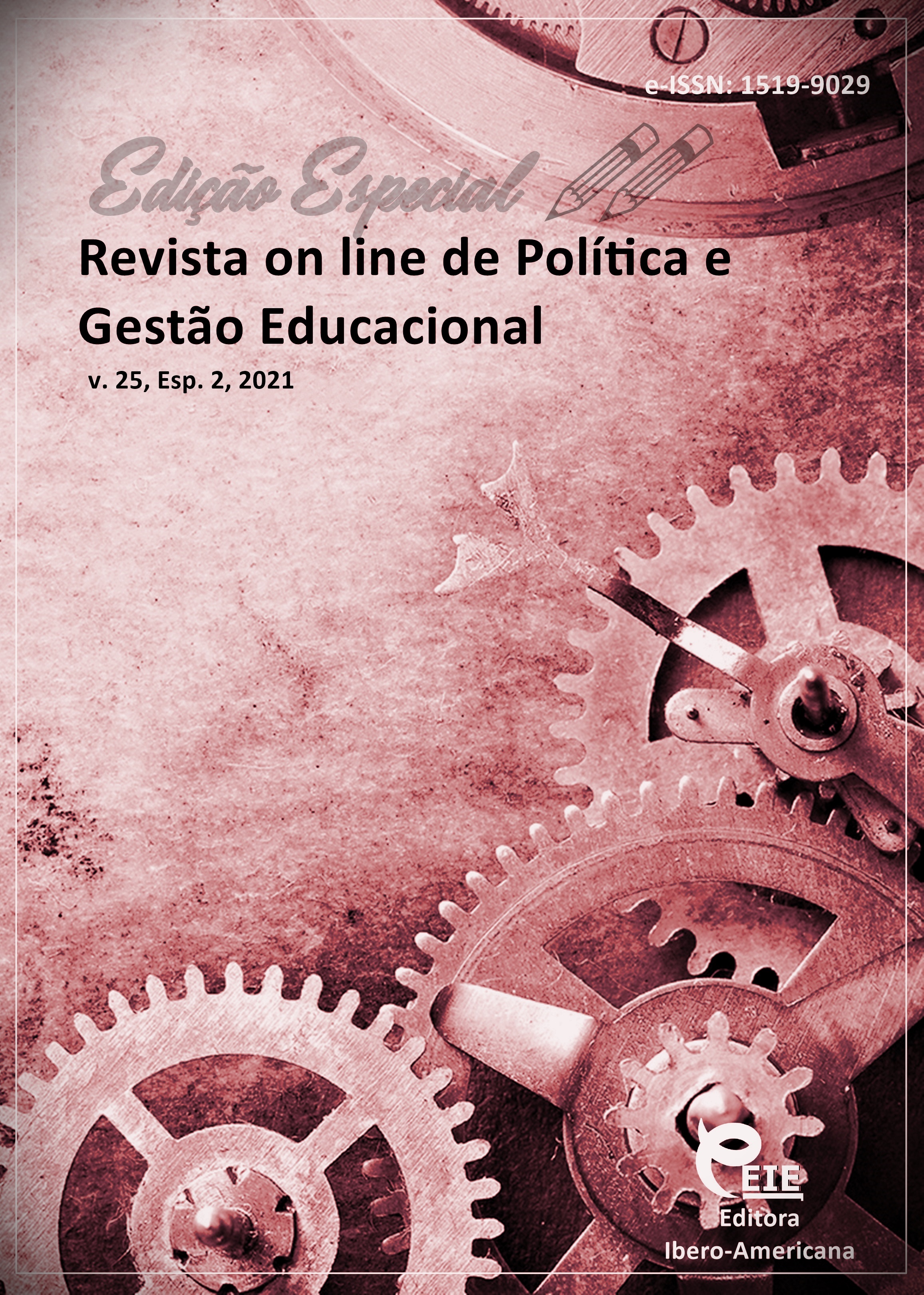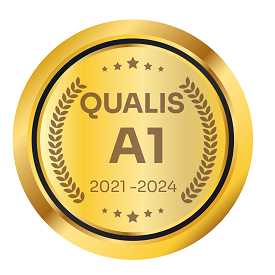Calidad y competitividad de los servicios educativos en la vista del estudiante: problemas y perspectivas
DOI:
https://doi.org/10.22633/rpge.v25iesp.2.15278Palabras clave:
Jóvenes estudiantes, Calidad de los servicios educativos, Satisfacción con los servicios educativosResumen
Hoy en día, se están produciendo varias transformaciones en la educación superior en Rusia, que está determinada principalmente por el hecho de que la cuestión de garantizar la calidad de los servicios educativos, aumentar los requisitos para el nivel de los graduados universitarios: futuros especialistas y la introducción de nuevos métodos de enseñanza. es bastante agudo. La investigación tiene como objetivo estudiar las peculiaridades de la percepción de los estudiantes sobre la calidad de la educación. Como método de investigación, utilizamos una encuesta de cuestionario para investigar de manera rápida y efectiva la idea de los estudiantes sobre la calidad de los servicios educativos que se les brindan. El artículo examina la actitud de los estudiantes hacia la educación que reciben y revela la representación de los estudiantes de la demanda de la educación que reciben en el mercado laboral. La novedad y originalidad del estudio radica en que se consideran las ideas de los estudiantes sobre la calidad de los servicios educativos. Se revela que los conocimientos que reciben los egresados se evalúan como de alta calidad, y se revelan varias deficiencias identificadas por los estudiantes en la formación profesional (conocimiento insuficiente de habilidades prácticas, idiomas extranjeros). Se demuestra que según los egresados, el nivel de formación de los especialistas responde principalmente a los requerimientos del mercado laboral. La importancia práctica de los datos obtenidos en este trabajo radica en su uso en psicología social, psicología de la edad, marketing y posterior desarrollo teórico de este tema.
Descargas
Citas
ADAMSKY, A. I. School should develop the country. Changes: ped. Zhurnal, v. 3, p. 4-18. 2005.
AITOV, N. A. Continuous education and higher education. Moscow: Znanie, 1986.
ANGELOVSKY, K. Teachers and innovations. Moscow: Prosveshchenie, 1991.
BAYANOVA, A. R.; ZAKIROVA, V. G. Assessment of the competitiveness of a higher school teacher: phenomenon, a, forecast. Obrazovaniye Lichnosti, v. 3, n. 4, p. 12-20, 2020.
BAYANOVA, A. R. et al. philosophical view of organizational culture policy in contemporary universities. European Journal of Science and Theology, v. 15, n. 3, p. 121-131, 2019.
BAYANOVA, A. R. Organizational and pedagogical conditions for the development of the competitiveness of a higher school teacher. Bulletin of the Chuvash State Pedagogical University named after I.Ya. Yakovlev, v. 3, n. 122, p. 159-164, 2020.
BAYANOVA, A. R. Pedagogical support for the development of competitiveness of a teacher of higher education. 2021. Thesis (PhD) – Volga region Federal University, Kazan, 2021.
BAYANOVA, A. R. To the question of the essence of the competitiveness of a higher school teacher in modern conditions. Kazan Pedagogical Journal, v. 6, n. 137, p. 24-30, 2019.
BEREZINA, T. N. Emotionally olfactory language of pedagogical communication. Psychology of learning, v. 1, p. 82-99, 2018.
BIM-BAD, B. M. Education for freedom of Russia. Pedagogy, v. 6, p. 3-8, 1993.
BRAZHNIK, E. I.; BARYSHNIKOV, D. N. The european union and the council of europe: education policy. St. Petersburg: Lik, 2002.
CHERDYMOVA, E. I. "Ecological consciousness" and "ecological culture" in the model of ecological education. Bulletin of the Saratov State Technical University, v. 4, p. 46-57, 2016.
CHERDYMOVA, E. I. Psychological bases of integration of ecological and professional consciousness in the process of training in higher education. Science and Business: ways of development, v. 4, p. 42-44, 2011.
CHERNIKOVA, T. V. Quality of educational institution management: theory. methodology. Work technologies of profile school head: Methodical manual. Moscow: Academy of Advanced Training and Professional Retraining of Educational Workers, 2005.
COOMBS, F. G. The crisis of education in the modern world. Moscow: Progress, 1970.
DZYATKOVSKAYA, E. N.; ZAKHLEBNY, A. N.; GNEUSHEVA, T. A. An approach to the definition of education indicators for sustainable development. Standards and monitoring in education, v. 4, n. 2, p. 11-17, 2016.
FEIGENBAUM, A. Product quality control. Moscow: Ekonomika, 1994.
FRUMIN, I. Evaluation of education quality: between control and support. The first of September, v. 92, p. 5-7, 2000.
GALAIDA, O. V. Economic aspects of the foreign experience of providing educational services and the possibility of its use in the Russian Federation. 2008. Thesis (PhD) – Diplomatic Academy of the Ministry of Foreign Affairs of the Russian Federation, Moscow, 2008.
GROMYKO, Y. V.; DAVYDOV, V. V. Education as a means of forming and cultivating the practice of socio-regional development. Russia-2010, v. 1, p. 17-22, 1993.
GROMYKO, Y. V. Organizational and activity games as a means of education development (technology of breakthrough into the future). Moscow: Independent Moscow University, 1992.
KARASEV, A. P. Research of consumer behavior. Organization and conduct of marketing research in the market of educational services. In: Theses of the seminar reports. Moscow: MESI Publishing House, 2020. p. 15-18.
KUVSHINOVA, T. U.; SOKOLOVA, O. A. Sociological research in the regional system of education quality assessment. Vologda: Legia, 2006.
LEBEDEV, O. E. Modernization of education management: prospects and problems: a methodological guide for self-analysis of managerial problems. St.Petersburg: St. Petersburg Academy of Postgraduate Pedagogical Education, 2006.
MUDRAK, S. A.; GAGARIN, A. V. In "The Year of Ecology": the formation of an eco-oriented personality at the stage of training in higher education. Acmeology, v. 3, n. 63, p. 7-16, 2017.
NOVIKOV, A. M.; NOVIKOV, D. A.; POSTALYUK, N. U. How to evaluate the quality of basic vocational education? Specialist, v. 9, p. 2-6, 2007.
NOVIKOVA, T. G. Expertise of innovative activity in education. Moscow: Academy of Advanced Training and Professional Retraining of Educational Workers, 2005.
OLKHOVAYA, T. A. et al. Description of the development in students’ communicative abilities. International Journal of Applied Exercise Physiology, v. 8, p. 501-511, 2019.
ROZLUTSKA, G. M. et al. Educational traditions of healthy lifestyle of pupils of public schools of transcarpathia (1919–1939). Medical education, n. 2, p. 127-132, 2020. DOI: 10.11603/me.2414-5998.2020.2.11162
SIMONOV, V. P. Pedagogical management. Moscow: Pedagogical Society of Russia, 1999.
SMIRNOV, I. P.; TKACHENKO, E. V. Primary vocational education: a social portrait of a student. Pedagogy, v. 5, p. 19-26, 2002.
YASVIN, V. A. Psychological foundations of environmental education. Educational Technologies, Moscow, v. 2, p. 25-35, 2019.
ZAIR-BEK, E. S.; TRYAPITSYNA, A. P. Quality of education as a scientific and pedagogical problem. In: Quality of education in modern school: collection of scientific articles. St. Petersburg: Publishing House of the Russian State Pedagogical University named after Herzen, 2000. p. 3-11.
ZAPESOTSKY, A. S. Education: philosophy, cultural studies, politics. Moscow: Nauka, 2002.
Publicado
Cómo citar
Número
Sección
Licencia
Derechos de autor 2021 Revista on line de Política e Gestão Educacional

Esta obra está bajo una licencia internacional Creative Commons Atribución-NoComercial-CompartirIgual 4.0.
Manuscritos aceitos e publicados são de propriedade da Revista on line de Política e Gestão Educacional. É vedada a submissão integral ou parcial do manuscrito a qualquer outro periódico. A responsabilidade do conteúdo dos artigos é exclusiva dos autores. É vedada a tradução para outro idioma sem a autorização escrita do Editor ouvida a Comissão Editorial Científica.











